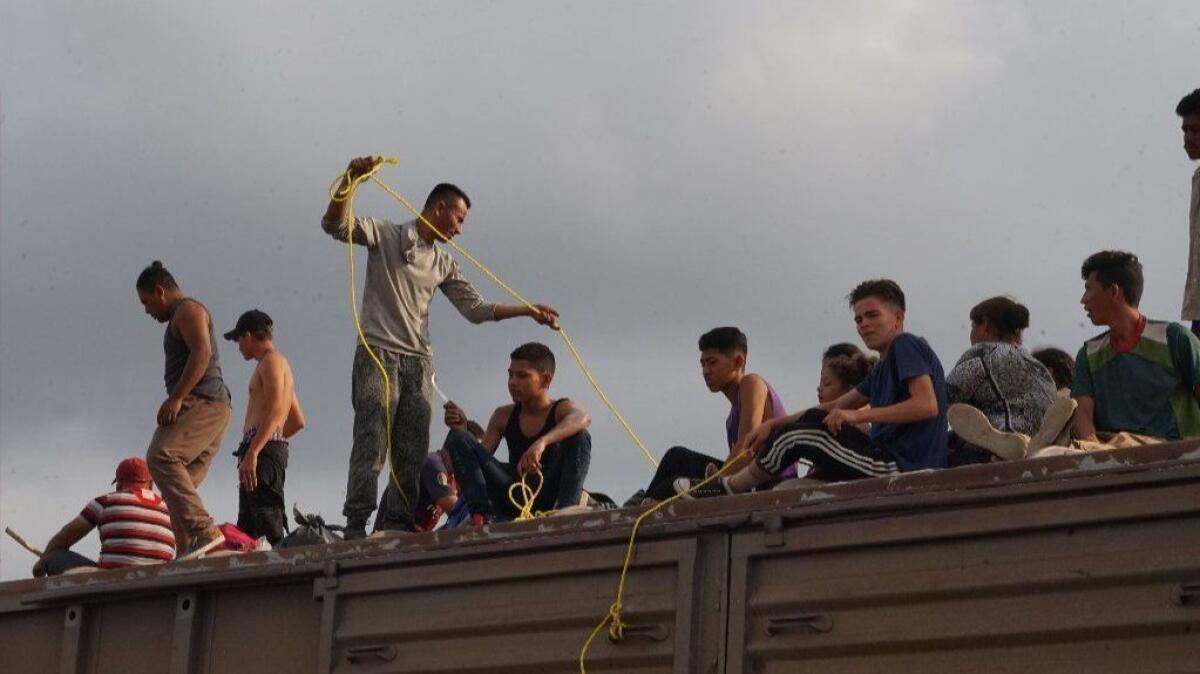Trump ‘deadly serious’ about tariffs on Mexico, aide says

- Share via
Reporting from Washington — A top White House aide said Sunday that President Trump is “absolutely, deadly serious” about imposing a 5% tariff on Mexican goods next week in a bid to stop migrants from reaching America’s southern border, brushing aside Wall Street jitters, warnings by some GOP lawmakers and reported misgivings by senior White House aides.
The bellicose tone by Mick Mulvaney, the acting White House chief of staff, dampened speculation that the two sides might reach a compromise in coming days to avert a confrontation that could hurt the Mexican economy, penalize U.S. consumers and manufacturers, and potentially drive more migrants northward.
Trump “is absolutely, deadly serious,” Mulvaney said on “Fox News Sunday.” “I fully expect these tariffs to go on to at least the 5% level on June 10. The president is deadly serious about fixing the situation at the southern border.”
The White House announced Thursday that the import tax will increase by 5 percentage points every month through October, topping out at 25%, unless Mexico takes significant action to stem the flow of migrants, mostly from Central America, who have surged to the U.S. border in recent months.
Mulvaney refused to say precisely what the White House wants Mexico to do, a tactic that may give both sides considerable room for political maneuvering going forward.
“We intentionally left the declaration sort of ad hoc,” he said.
“So, there’s no specific target, there’s no specific percentage, but things have to get better,” he added. “They have to get dramatically better and they have to get better quickly.”
Mexico’s foreign secretary, Marcelo Ebrard, rushed to Washington after the surprise announcement and will lead a delegation to meet with Secretary of State Michael R. Pompeo and other U.S. officials on Wednesday, after Pompeo gets back from Europe.
White House officials have expressed confidence that the Mexican delegation would present proposals for helping stem the migrant flow, giving Trump a much-needed win on an issue that is central to his 2020 reelection bid.
Mexico’s president, Andres Manuel Lopez Obrador, said he expected “good results” from the talks, and hinted his government may do more to block organized smuggling routes that have funneled hundreds of thousands of Central Americans toward the U.S. border.
In a news conference Saturday in Veracruz, Lopez Obrador said Mexico could step up its migration enforcement measures in order to reach a deal with the White House.
“The main thing is to inform about what we’re already doing on the migration issue, and if it’s necessary to reinforce these measures without violating human rights, we could be prepared to reach that deal,” Lopez Obrador said.
Lopez Obrador, who took office in December, said his government had a plan to ease the economic disruption in case Trump imposes the tariffs, although he did not provide any details.
“We’re doing all we can to reach a deal through dialogue,” he said. “We’re not going to get into a trade war, a war of tariffs and of taxes.”
Trump, who first made the tariff threat on Twitter on Thursday, repeated it Sunday, tweeting that Mexico is an “ ‘abuser’ of the United States.” He added, “America has had enough.”
Many economists have publicly disputed the president’s understanding of how tariffs work. In an escalating trade confrontation with China, Trump has repeatedly claimed that Beijing, not American consumers, would bear the costs of tariffs on Chinese imports.
Business leaders, including Detroit automakers and big agriculture, have warned that the tariffs will be passed to U.S. consumers in the way of higher prices for cars, dishwashers, fruit and other household goods.
Mulvaney appeared to dismiss those concerns Sunday.
“American consumers will not pay for the burden of these tariffs,” he said, adding that “there’s already a price” in the form of “hundreds of billions of dollars” for immigrants in the country illegally.
Trump has long blamed Mexico for failing to close its border with Guatemala to Central Americans fleeing violence and poverty in their homelands. The White House also wants Mexican authorities to make it safer for migrants to stay in Mexico rather than apply for U.S. asylum.
His administration also has slashed U.S. aid to El Salvador, Guatemala and Honduras meant to improve living conditions and encourage people to stay home rather than making the perilous journey north.
Critics of Trump’s tariff plan warned that causing economic pain in Mexico will only encourage out-of-work Mexicans to head north as well. The number of Mexican males apprehended at the border has dropped sharply in recent years as the country’s economy has improved.
The White House also deployed acting Homeland Security Secretary Kevin McAleenan to defend the president’s efforts to use trade tariffs as a cudgel against Mexico over immigration.
Appearing on CNN’s “State of the Union,” McAleenan said Trump has “made clear… we need a vast reduction in the numbers crossing” the border and demanded that Mexico take action at choke points on its southern border.
“These crossings into Mexico are happening on a 150-mile stretch of their southern border,” he said. “This is a controllable area. We need them to put their authorities down there and interdict these folks before they make this route all the way to the U.S.”
Mulvaney, in a separate appearance on NBC’s “Meet the Press,” denied media reports that senior White House aides had tried to dissuade Trump from announcing the planned tariffs.
The Washington Post and other news outlets reported that Trump, acting in concert with immigration hard-liner Stephen Miller, had overruled concerns from Jared Kushner, his son-in-law and a senior advisor, as well as Robert Lighthizer, the U.S. trade representative.
More to Read
Get the L.A. Times Politics newsletter
Deeply reported insights into legislation, politics and policy from Sacramento, Washington and beyond. In your inbox three times per week.
You may occasionally receive promotional content from the Los Angeles Times.










